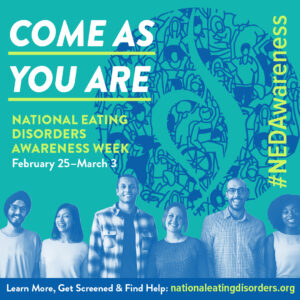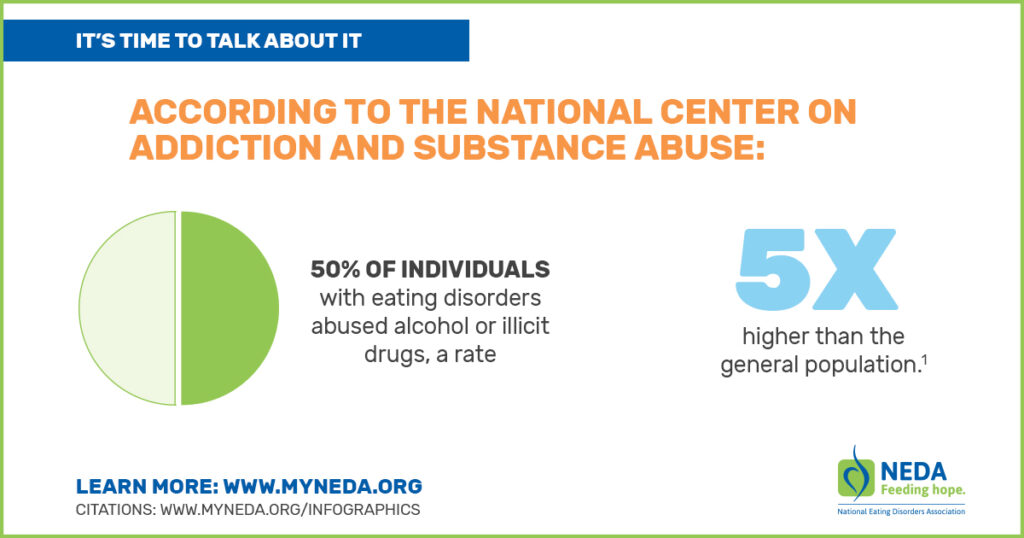February 25 – March 3, 2019, is National Eating Disorders Awareness Week or NEDA. It is vital that people across America open up a dialogue about food, body image, eating disorders, and co-occurring mental illness. Such conditions include Anorexia Nervosa (AN), Bulimia Nervosa (BN), Binge Eating Disorder (BED), Avoidant-Restrictive Food Intake Disorder (ARFID). As many as 20 million women and 10 million men will contend with one of the above disorders at some point in their lives, according to the National Eating Disorder Association.
Eating disorders affect people from all walks of life, regardless of age or gender. Moreover, a person can have an unhealthy relationship with food even if she or he does not meet all the specific criteria for one or more of these complex bio-social illnesses. Naturally, there is much stigma surrounding conditions like AN or BN. Experts refer to these cases as Other Specified Feeding or Eating Disorder or OSFED. Any eating disorder, like most other mental health conditions recognized in the Diagnostic and Statistical Manual of Mental Disorders (Fifth Edition), can be fatal if left untreated.
Mental health conditions involving food intake or body image are many. Disordered eating can go unnoticed for years due to societal pressure to look a certain way. What’s more, even those who appear to be at the peak of physical fitness can be suffering from an eating disorder. Many professional athletes place enormous dietary restrictions on themselves or have them imposed by coaches. In many sports, being lighter can mean a competitive edge against an opponent, i.e., cycling, gymnastics, or horse racing. Many professional athletes require assistance.
Male Athletes With Eating Disorders
While most people associate eating disorders as conditions usually affecting women, men struggle too. Millions of males, of all ages, battle with eating disorders at some point in their life and many of them are athletes. This week, Soledad O’Brien probed the dark side of athletics for Real Sports with Bryant Gumbel. O’Brien points out that a third of people struggling with an eating disorder are men; she goes on to highlight how athletes are at a heightened risk.
What makes you a great, elite athlete can also make you ‘great,’ if you will, at having an eating disorder,” O’Brien shares with Men’s Health in an interview. She adds, “I think what can first be read as commitment eventually becomes dedication gone horribly wrong.”
Please take a moment to watch a clip on the subject from Real Sports:
If you are having trouble watching, please click here.
Eating Disorder and Co-Occurring Mental Illness
Some people meet the criteria for both eating disorder and co-occurring mental illness. Anxiety, substance abuse, obsessive-compulsive disorder, depression, or post-traumatic stress disorder plague many people who struggle with eating disorders. Fortunately, a full recovery from an eating disorder and dual diagnosis are possible. It is vital that such individuals receive treatment for each condition simultaneously for successful recovery outcomes.
The National Eating Disorders Association shares that up to 50% of individuals with eating disorders abused alcohol or illicit drugs. The most commonly misused substances by persons with eating disorders are alcohol, laxatives, emetics, diuretics, amphetamines, heroin, and cocaine. Furthermore, some 35 percent of people with substance use disorders or SUDs also have a co-occurring eating disorder.
Please watch a short video on the subject:
If you are having trouble watching, please click here.
It is critical to keep in mind, substance use disorder can follow disordered eating or the other way around. In the video, Amy Baker Dennis makes clear that substance abuse problems can affect people after they undergo eating disorder treatment. She makes clear that people with binge eating disorders (BED) are particularly vulnerable to developing substance use disorder. Up to 57 percent of men with BED also have a co-occurring substance abuse problem.
We can all have a hand to starting conversations about eating disorders and co-occurring mental illness during NEDA. Please follow this link to learn more.
Co-Occurring Mental Illness Treatment for Men
In the field of addiction medicine, we know that people will often swap one use disorder for another following some time in recovery. Those at risk of one form of mental illness are at a higher risk of developing comorbidity.
If you are a male who struggles with mental illness, we invite you to contact PACE Recovery Center for support. With an accredited team of physicians, doctorate-level clinicians and drug and alcohol counselors we offer treatment for mood disorders, personality disorders and mental health conditions including disordered eating and our mental health program for men can help you make lasting changes and go on to lead a productive life in recovery.




